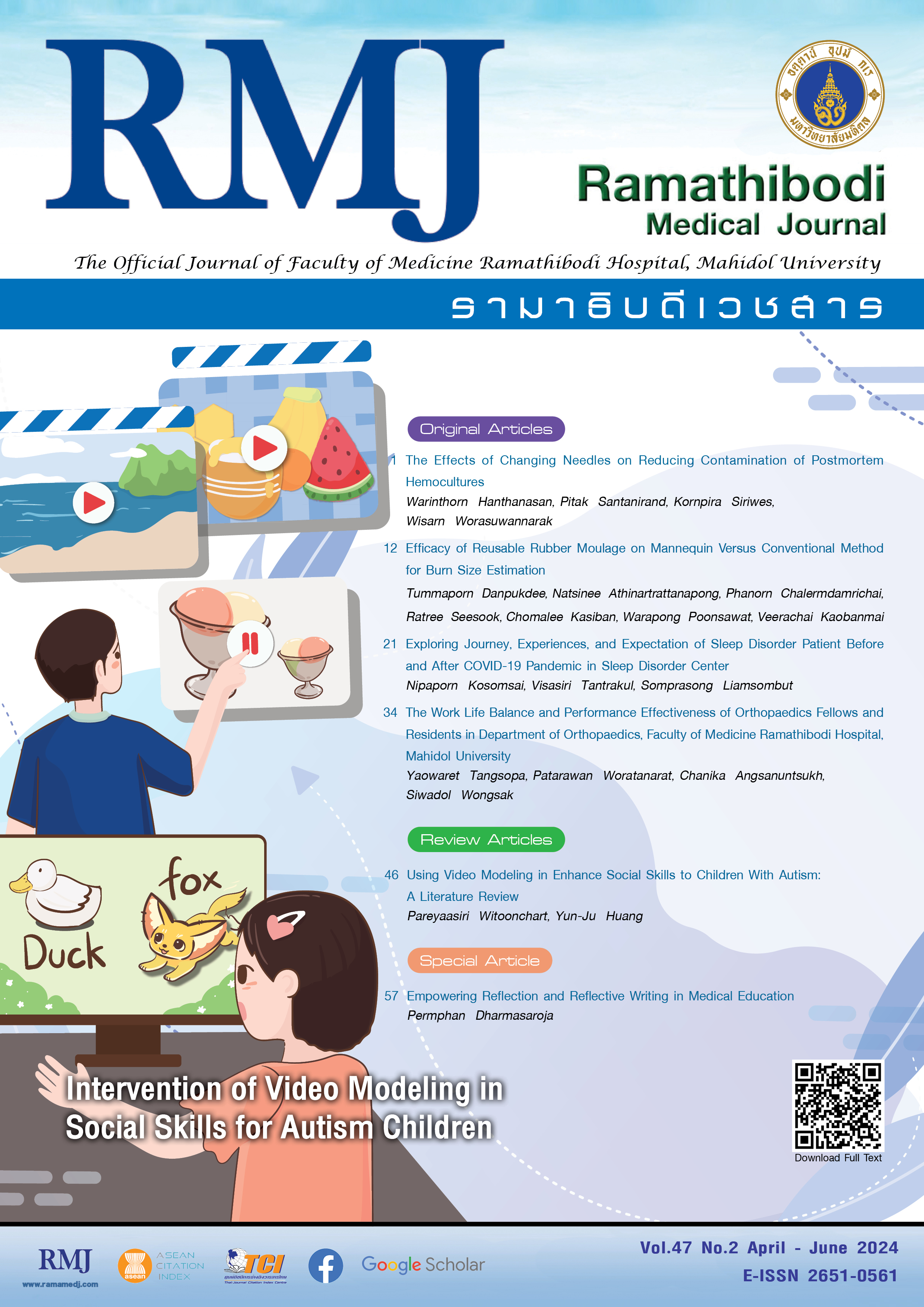การเสริมพลังแห่งการสะท้อนการเรียนรู้และการเขียนการสะท้อนการเรียนรู้ทางแพทยศาสตรศึกษา
Main Article Content
บทคัดย่อ
การสะท้อนการเรียนรู้และการเขียนการสะท้อนการเรียนรู้เป็นองค์ประกอบสำคัญในการศึกษาทางการแพทย์ ช่วยให้นักศึกษาเจาะลึกเข้าไปในประสบการณ์ของตนเอง ส่งเสริมความเข้าใจอย่างลึกซึ้งเกี่ยวกับสถานการณ์ทางคลินิกและปฏิสัมพันธ์ของผู้ป่วย บ่มเพาะการตระหนักรู้ในตนเอง การคิดอย่างมีวิจารณญาณ และความเห็นอกเห็นใจ คำว่า “การสะท้อนการเรียนรู้” มีการตีความได้หลายแบบ โดยสรุปเป็นแนวคิดของการทำความเข้าใจตนเองและสิ่งแวดล้อมโดยรอบ เพื่อให้เป็นแนวทางในการแสดงพฤติกรรมในอนาคตด้านแพทยศาสตรศึกษา ทั้งนักศึกษาและอาจารย์แพทย์ต้องเผชิญกับความท้าทายในการนำการสะท้อนการเรียนรู้ไปปฏิบัติ จึงจำเป็นต้องมีแนวปฏิบัติและการสนับสนุนตลอดกระบวนการ การสะท้อนการเรียนรู้อย่างมีประสิทธิภาพระหว่างนักศึกษาและอาจารย์แพทย์ในสภาพแวดล้อมทางคลินิกจำเป็นต้องอาศัยทักษะการสะท้อนการเรียนรู้ที่ดีผ่านอุปสรรคที่อาจเกิดขึ้นในการอภิปรายแบบเปิดและการจัดการผลกระทบทางอารมณ์ เพื่อจัดการกับความท้าทายเหล่านี้ อาจารย์แพทย์ควรต้องมีการตระหนักรู้ในตนเองและความสามารถในการปรับตัวเพื่อตอบสนองความต้องการที่หลากหลายของนักศึกษาแต่ละคน โมเดลต่าง ๆ ของการสะท้อนการเรียนรู้เป็นกรอบเพื่อจัดระเบียบกระบวนการสะท้อนการเรียนรู้ โดยจัดแบ่งได้เป็นแนวทางแบบ ‘วนซ้ำ’ และแบบ ‘แนวดิ่ง’ การนำไปใช้อย่างสัมฤทธิผลขึ้นกับการเลือกองค์ประกอบจากโมเดลต่าง ๆ เพื่อปรับแต่งการสะท้อนการเรียนรู้ให้ตรงกับความต้องการ การสะท้อนการเรียนรู้และการเขียนการสะท้อนการเรียนรู้เป็นสิ่งสำคัญยิ่งสำหรับอาจารย์แพทย์ เนื่องจากช่วยให้สามารถให้คำปรึกษาแก่ผู้เรียนได้อย่างมีประสิทธิภาพ โดยเป็นการบ่มเพาะวัฒนธรรมของการเป็นแพทย์ผู้สะท้อนคิด ซึ่งจะส่งเสริมการเรียนรู้อย่างต่อเนื่อง การปฏิบัติตามหลักจริยธรรมและการพัฒนาวิชาชีพของแพทย์ในอนาคต
Article Details

This work is licensed under a Creative Commons Attribution-NonCommercial-NoDerivatives 4.0 International License.
All articles are distributed by the Creative Commons Attribution (CC BY-NC-ND) license. Copyright © 2024 by the Authors. Licensee RMJ, Faculty of Medicine Ramathibodi Hospital, Mahidol University, Bangkok, Thailand.
References
University of Wolverhampton. Skills for Learning: Guide to Reflective Writing. Accessed November 30, 2023. https://www.wlv.ac.uk/lib/media/departments/lis/skills/study-guides/LS006---Guide-to-Reflective-Writing.pdf
Cole M. Learning through reflective practice: a professional approach to affective continuing professional development among healthcare professionals. Res Post-Compuls Educ. 2000;5(10):23-38. doi:10.1080/13596740000200067
Branch WT Jr, George M. Reflection-based learning for professional ethical formation. AMA J Ethics. 2017;19(4):349-356. doi:10.1001/journalofethics.2017.19.4.medu1-1704
Dewey J. How We Think: A Restatement of the Relation of Reflective Thinking to the Educative Process. D.C. Heath & Co Publishers; 1933.
Kolb DA. Experiential Learning: Experience as the Source of Learning and Development. Prentice Hall; 1984.
Boud D, Keogh R, Walker D. Reflection: Turning Experience into Learning. Kogan Page; 1985.
Gibbs G. Learning by Doing: A Guide to Teaching and Learning Methods. Further Education Unit at Oxford Polytechnic; 1988.
Sandars J. The use of reflection in medical education: AMEE Guide No. 44. Med Teach. 2009;31(8):685-695. doi:10.1080/01421590903050374
Schön DA. The Reflective Practitioner: How Professionals Think in Action. Basic Books; 1983.
Vygotsky LS. Mind in Society: The Development of Higher Psychological Processes. Harvard University Press; 1978.
Lave J and Wenger E. Situated Learning: Legitimate Peripheral Participation. Cambridge University Press; 1991.
Tomlinson J. Using clinical supervision to improve the quality and safety of patient care: a response to Berwick and Francis. BMC Med Educ. 2015;15:103. doi:10.1186/s12909-015-0324-3
Marton F, Saljo R. On qualitative differences in learning: I-outcome and process. Br J Educ Psychol. 1976;46(1):4-11. doi:10.1111/j.2044-8279.1976.tb02980.x
General Medical Council. Promoting excellence: standards for medical education and training. July 15, 2015. Accessed November 30, 2023. https://www.gmc-uk.org/-/media/documents/promoting-excellence-standards-for-medical-education-and-training-2109_pdf-61939165.pdf
General Medical Council. The Reflective Practitioner: Guidance for doctors and medical students. Accessed November 30, 2023. https://www.gmc-uk.org/-/media/documents/dc11703-pol-w-the-reflective-practioner-guidance-20210112_pdf-78479611.pdf
Moon J. A Handbook of Reflective and Experiential Learning: Theory and Practice. Routeledge Falmer; 2004.
Boud D, Walker D. Promoting reflection in professional courses: the challenge of context. Stud High Educ. 1998;23(2):191-206. doi:10.1080/03075079812331380384
Finlay L. Reflecting on ‘Reflective practice’. Practice-based Professional Learning Paper 52. The Open University; 2008. Accessed November 30, 2023. https://oro.open.ac.uk/68945/1/Finlay-%282008%29-Reflecting-on-reflective-practice-PBPL-paper-52.pdf
Academy of Medical Royal Colleges. Improving feedback and reflection to improve learning: a practical guide for trainees and trainers. May 10, 2017. Accessed November 30, 2023. http://www.aomrc.org.uk/wp-content/uploads/2017/06/Improving_Feedback_0517-2.pdf
Mann K, Gordon J, MacLeod A. Reflection and reflective practice in health professions education: a systematic review. Adv Health Sci Educ Theory Pract. 2009;14(4):595-621. doi:10.1007/s10459-007-9090-2
Driscoll J. Reflective practice for practise. Sr Nurse. 1994;14(1):47-50.
Borton T. Reach, Touch, and Teach: Student Concerns and Process Education. McGraw-Hill; 1970.
Mezirow J. Transformative Dimensions of Adult Learning. Jossey-Bass; 1991.
Hatton N, Smith D. Reflection in teacher education: towards definition and implementation. Teach Teach Educ. 1995;11(1):33-49. doi:10.1016/0742-051X(94)00012-U
Johns C. Framing learning through reflection within Carper’s fundamental ways of knowing in nursing. J Adv Nurs. 1995;22(2):226-234. doi:10.1046/j.1365-2648.1995.22020226.x
Johns C. Becoming a Reflective Practitioner: A Reflective and Holistic Approach to Clinical Nursing, Practice Development and Clinical Supervision. Blackwell Science; 2000.
Moon J. Learning Journals: A Handbook for Academics, Students and Professional Development. Kogan Page; 1999.
Brookfield S. Becoming a Critically Reflective Teacher. Jossey Bass; 2005.
Driscoll J. Supported reflective learning: the essence of clinical supervision? In: Driscoll J, eds. Practising Clinical Supervision: A Reflective Approach for Healthcare Professionals, 2nd ed. Bailliere Tindall; 2007:27-50.
Ryan M. Improving reflective writing in higher education: a social semiotic perspective. Teach High Educ. 2011;16(1):99-111. doi:10.1080/13562517.2010.507311




